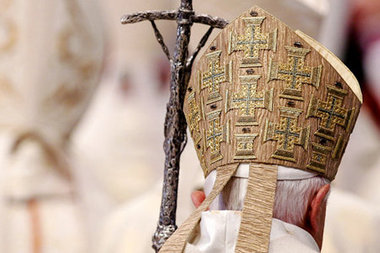"Mea Maxima Culpa" Review: Unholy Orders
By Stephen Whitty
Alex Gibney's new film begins with dark shots of Gothic architecture, ominous figures moving through murky shadows and, in the background, faintly chanted Latin. It feels a bit like a monster movie. It is, too. Sadly, though, "Mea Maxima Culpa: Silence in the House of God" is a documentary about real-life horrors - the sexual abuse (and coverups) that have tortured countless innocents, bedeviled the Catholic Church and caused many to question their faith. The Summit-based documentarian, always a careful filmmaker, begins by focusing on a single, albeit monstrous case - a priest who, for decades, abused boys at a Wisconsin boarding school for the deaf. But then, it slowly widens its gaze - to see similar horrors taking place in Ireland, in Italy, in Latin America. And to uncover a pattern of deceit that both denied the victims help and practically ensured their abusers could continue the assaults. The details are sickening. (The Milwaukee priest not only targeted lonely children with limited communication skills, he actually abused them in the confessional.) It's a film made to enrage. And it's the kind of rage that burns brightest from someone who, like Gibney, was raised Catholic, and feels particularly, personally horrified by the way these familiar figures of respect used their positions to betray and intimidate the faithful. Yet, typically, Gibney's style remains completely professional. The American victims - now middle-aged men - sit for formal interviews, answering questions in ASL. (A quartet of actors - including Ethan Hawke and Chris Cooper - provide the voiceovers.) The film is carefully lit, and beautifully edited. It is also - no matter what you are likely to hear from apologists like the Catholic League - absolutely fair. Gibney interviews archbishops, priests, a reporter for a Catholic newspaper. (He tried to speak to figures at the Vatican, too, but was turned down.) What they have to say is fascinating, too. There's the story, for example, of one priest who did work early on with clerical sex abusers. His considered opinion? They were incurable, and needed to be immediately removed from ministry. (He suggested lifelong exile to a remote island monastery.) And there's the interview with a priest who is often called as an expert witness in these cases and, he says, "always" testifies on behalf of the Church. But, he adds, that's because to him the Church isn't an institution but a faith, not a building but the people in the pews. The film gets a little arty when it indulges in dramatic re-creations, and a bit diffuse when it delves into Vatican politics. It also doesn't touch on why it there's been such an explosion of cases recently, or on the controversial topic of a supposedly chaste and celibate male clergy. But that's probably best. As the recent scandals at Penn State proved, this isn't an issue of dogma; it's an issue of authority figures using their authority to prey on the most vulnerable among them, exploiting their dependency and ensuring their silence. And "Mea Maxima Culpa" is the story of how one group finally found a way to be heard. Ratings note: The film contains adult subject matter.
|
.
Any original material on these pages is copyright © BishopAccountability.org 2004. Reproduce freely with attribution.
